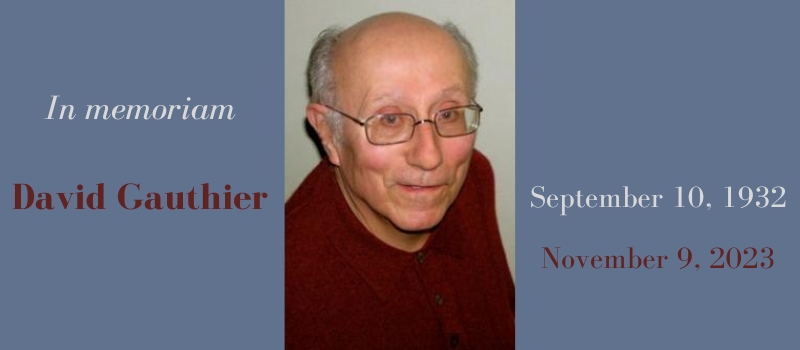
It is with great sadness that the Department of Philosophy announces that our colleague, friend, alumnus, and respected teacher David Gauthier has died. He passed away on Thursday, November 9, 2023, at the age of 91.
Gauthier earned a bachelor’s degree in philosophy from our department in 1954, to then do graduate work first at Harvard and then at Oxford. He rejoined the department in 1958, serving as chair from 1974 to 1979. In 1980, he left for the University of Pittsburgh, but moved back to Toronto post retirement, and actively participated in many departmental events.
The focus of Gauthier’s most prominent research was the relation between morality and rational choice, most significantly in his 1986 book Morals by Agreement. Questions about the relation between morality and self-interest, and the relation of each to rationality, have proved central to Western philosophy since its beginning. Gauthier’s work drew on developments in the theory of rational choice and game theory to provide a novel argument for both the rational basis of morality and the limits that morality so understood must, he argued, inevitably have. He introduced the concept of constrained maximization to explain how rational beings could have a fundamental motivation to refrain from maximizing in certain types of interactions, and how much rational agents would be willing to concede in reaching cooperative solutions to their common problems. Gauthier continued to refine his ideas about the relation between rationality and morality. During his post-retirement years in Toronto, he completed and published two additional books on the topic, Hobbes and Political Contractarianism and Rational Deliberation, both of which appeared in 2022, just before his ninetieth birthday.
Gauthier was also an important historian of political philosophy, with his 1968 book The Logic of Leviathan leading to a resurgence of interest in Hobbes’s political philosophy. In many way, Gauthier’s interest in Hobbes aligned with his interest in rational choice. He also published important work on Rousseau, a figure far removed from the idea of grounding anything in the rationality of a stable, self-sufficient self. The central focus of Gauthier’s 2006 Rousseau: The Sentiment of Existence was the instability of the self, as well as Rousseau’s multiple attempts to create through artifice the circumstances in which a stable self could emerge. Gauthier argued that the central theme running through all of Rousseau’s writings is the attempt to enable freedom by making a person’s powers adequate to their desires. This theme emerges in Émile, which tries to create a self-sufficient individual; in The Social Contract, in which citizens unite their powers to reshape their wills; and in Rousseau’s autobiographical writings (the Confessions and Reveries), in which the individual seeks independence through isolation. Gauthier argues that none of these can succeed, and that Rousseau recognizes this, which is why he always brings in a mysterious outsider—the tutor in the Émile, or the Legislator in The Social Contract (who Gauthier described as an “eruption into history”)—figures who cannot themselves be free but stage-manage the lives of others to provide an appearance of freedom.
During his time as departmental chair, Gauthier presided over the unification of the St. George department, integrating the earlier college Ethics Departments and the much larger St. Michael’s College Philosophy Department.
Gauthier’s work has had enormous influence on philosophy and generated widespread recognition. His seventieth birthday saw the publication of a Festschrift in his honour; on his eightieth birthday, friends and students endowed a graduate scholarship in his name; and his two final books were launched at an event in the University of Toronto’s Department of Philosophy on his ninetieth birthday. Yet his circle of admirers and stellar reputation extends well beyond philosophy; Asteroid 15911 was named after him. His presence will be greatly missed.
SHARE